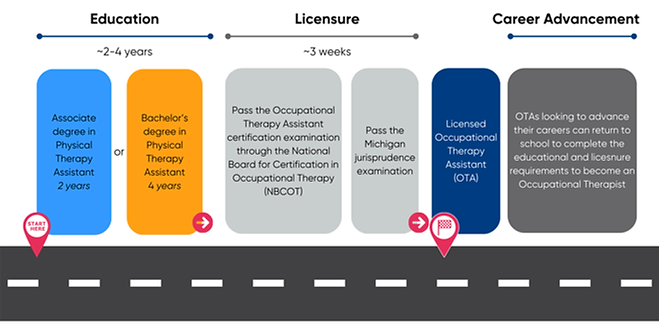
Occupations: Occupational Therapy Assistants
Occupational Therapy Assistants
Overview of the profession:
Occupational Therapy Assistants (OTAs) play a crucial role in the healthcare system by supporting Occupational Therapists in helping patients achieve greater independence in their daily activities. They work closely with individuals of all ages who may be recovering from injury, managing chronic conditions, or facing developmental challenges. OTAs assist in implementing customized treatment plans, providing hands-on support, and guiding patients through therapeutic exercises and activities designed to improve fine motor skills, cognitive function, and overall quality of life. To become an OTA, individuals must first complete an associate or bachelor's degree in occupational therapy assistant from a program accredited by the Accreditation Council for Occupational Therapy Education. Once graduated, individuals must pass the Michigan Jurisprudence examination and the Occupational Therapy Assistant certification examination through the National Board for Certification in Occupational Therapy to be eligible for licensure. Licensed OTAs work alongside Occupational Therapists in hospitals, nursing homes, rehabilitation centers, and home health agencies. By fostering patient resilience and motivation and enabling patients to reach their rehabilitation goals effectively, OTAs are essential in enhancing the functional abilities of those they serve.
OTA Career Pathway
What is needed to become a licensed Occupational Therapy Assistant in Michigan?
To become a licensed Occupational Therapy Assistant (OTA), individuals must first complete an associate or bachelor’s degree in occupational therapy assistant from a program accredited by the Accreditation Council for Occupational Therapy Education (ACOTE). Then to be eligible for licensure, applicants need to pass the Michigan jurisprudence examination and the Occupational Therapy Assistant certification

examination through the National Board for Certification in Occupational Therapy. Note: the minimum education required for OTA licensure is an associate degree. A bachelor’s degree in OTA may provide individuals with more earning potential, however, as an associate degree is the most common for individuals to attain, there is only one accredited bachelor’s OTA program in Michigan.
How can OTAs advance their careers?
OTAs looking to advance their career can return to school to become licensed Occupational Therapists. OTAs with an associate degree will need to meet admission requirements for an occupational therapy program, which includes completion of a bachelor’s degree. Some institutions offer a combined or accelerated bachelor’s degree and master’s in occupational therapy for eligible students, which may shorten the time to complete an educational program.
For current and comprehensive licensure requirements, please visit: www.michigan.gov/lara/bureau
Current Workforce Data
We've provided the latest data from Lightcast below. Lightcast gathers and integrates economic, labor market, demographic, education, profile, and job posting data from dozens of government and private-sector sources, creating a comprehensive and current dataset that includes both published data and detailed estimates with full United States coverage.
Click on the images to enlarge them and review them in further detail.

2025 Hourly Wages
10th Percentile | 25th Percentile | Median | 75th Percentile | 90th Percentile |
|---|---|---|---|---|
$23.62 | $26.85 | $29.50 | $32.90 | $37.45 |
Top Posted Job Titles
-
Certified Occupational Therapy Assistants
-
Occupational Therapy Assistants
-
Lot Assistants
-
Therapists/Certified Occupational Therapy Assistants
-
Travel Occupational Therapists
-
Travel Certified Occupational Therapy Assistants
-
Rehabilitation Occupational Therapists
-
Student Assistants
-
Home Health Occupational Therapy Assistants
-
Directors of Occupational Therapy
Index Ranking
Ranked 16th (out of 36) "healthiest" profession according to the 2025 Michigan Healthcare Workforce Index.
Learn more here.
2025 Employment: 1,455
Projected 2035 Employment: 1,731 (+19%)
Highlighted Workforce Initiatives
Name: Flint Healthcare Employment Opportunities (FHEO) Program
Prosperity Region: 6
Description: The Flint Healthcare Employment Opportunities (FHEO) Program is offered through GST Michigan Works! and the Greater Flint Health Coalition. The FHEO Program is designed to increase the number of workers in 10 high-demand healthcare jobs in Genesee County. Examples of high-demand healthcare roles include CNA, phlebotomist and respiratory therapist. Program participants receive free tuition to become trained, career advising, support services, job development assistance and work/life skills training. The FHEO Program has been around since 2002 and is funded by GST Michigan Works! and the Charles Stewart Mott Foundation.
Name: Kent Career Tech Center CTE
Prosperity Region: 4
Description: The Medical Mentors Pipeline Program provides highly motivated high school or college students with a 6-week summer program that provides direct exposure to a career in medicine. Students explore a variety of medical specialties during three, 2 week long rotations while directly interacting with attending physicians, residents, and other healthcare providers to gain exposure and a better understanding of what is required in order to become a physician. Admitted students complete several required assignments and attend didactics over the course of the program as well. The goal of the program is to increase the number of medical professionals that are from diverse and/or marginalized backgrounds.
Name: MiCareerQuest
Prosperity Region: 7
Description: MiCareerQuest is a one-day, employer-led, hands-on, multi-career exploration event that is held across the state of Michigan. It is an initiative that is geared toward middle or high school students and it is meant to expose students to careers they may have never heard about or considered before. The MiCareerQuest highlights careers in the health sciences industry among others. MiCareerQuest events are held annually and are hosted by different Michigan Works! agencies for the Michigan regions that they support.








